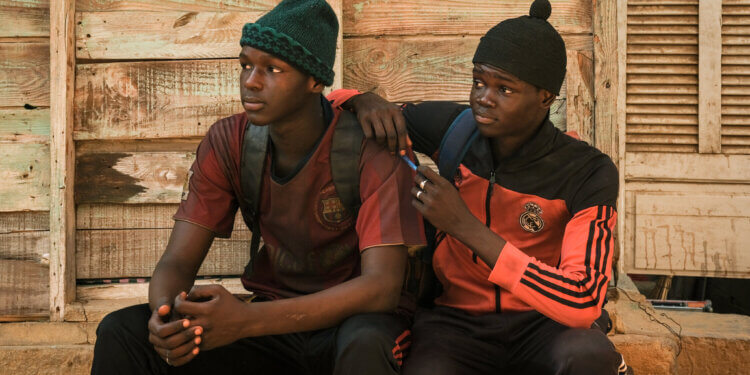Within the paragraphs of news articles, the issue of immigration is one of the existential problems European countries just can’t seem to agree on. Tied to their humanitarian commitment to take in asylum seekers while controlling the growing animosity of stretching resources away from their own citizens, the many people who make the dangerous journey away from their homes in hopes of a better life in Europe are reduced to nothing more than monthly statistical entries to highlight the need or lack thereof for border security. Io Capitano, a film produced by Canal+, sheds light on this problem in just over two hours by showing, in ghastly detail, the trammel journey immigrants have to make. It’s a story that has been told and retold many times in different communities and genres, yet punches with the same emotional weight every time.
Through the eyes of two teenage cousins – Seydou (Seydou Sarr) and Moussa (Moustapha Fall) – the film drives them out of the comfort of their Senegalese home through the dunes of the Sahara Desert and out through Libya into the Mediterranean Sea. It’s a journey that, when glanced over on an African map, seems insurmountable, yet from the many men, women, and children they meet along on their pilgrimage, it is a journey many are willing to make. The protagonist, Seydou, isn’t running away from anything in particular, connected to his big family and the bubbling innocence that turns his mother’s reprimand into a musical chorus. Yet, the idea of living in Europe is enough to excite his curiosity to seek an elusive dream that everyone warns him against. With nothing more than a bundle of cash and a local witch doctor’s blessing, Seydou and his cousin begin the journey that drenches every last drop of innocence out of them.
Entirely devoted to realism in a story that mostly relies on the abjection of its characters, Io Capitano doesn’t spare the protagonists or the audience the full dose of torturous hostility from nature and humans alike. From falling out of a racing truck in the middle of the desert to the desolate sight of a woman dying under the scotch of the sun and the literal torture under the hands of ransom-seeking militia, every turn the two boys make comes with their own fair share of tribulations. From decaying bodies in the desert to being bundled among crowds of people on the same journey to finding fellow Senegalese along the way, the journey the boys make is depicted as one taken by so many with so little success that, by the course of the film, the hope that once guided the boys is snuffed out. Little glimmers of hope are sprinkled in, mostly from the rectitude of characters they meet along the way who share the plight of the young travellers, but these moments are spread between large portions of gut-wrenching scenes that they fail to make it any better for the boys.
Co-written and directed by Matteo Garrone, an Italian filmmaker, Io Capitano embraces the scenery and people from whom the story is based. Right from the start, the locations and design of its scenes are grounded in the reality of Senegal. The cinematography doesn’t linger in one place for too long, shifting from expansive aerial shots through the desert and informal settlements built along the way to intimate close-ups of the animated faces of the characters. The film requires little dialogue, with the visual elements so perfectly elaborate, and the strong performance by the lead, Sydou Sarr, infuses so much emotion into the character that holds the film together.
There is good reason to celebrate such a realistic and well-made portrait of an African story fighting for an Oscar in the Best International Feature category, albeit for Italy, with a respectful adherence to the culture and way of life of the Senegalese people from whose plight it sources its narrative. However, at the end of it all, the film feels stripped of purpose that it’s hard for me to identify who exactly it is made for. Whether as a cautionary tale or an attempt to humanise the immigrant’s quandary, Io Capitano is careful not to infringe on any polarised ideology, which helps it tell a personal and exhaustive story that, unfortunately, ultimately seems toothless











